

Are We Facing a Post-COVID-19 Suicide Epidemic? There seems to be no getting away from the coronavirus disease 2019 (COVID-19) pandemic.
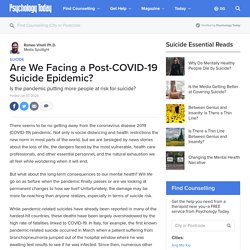
Not only is social distancing and health restrictions the new norm in most parts of the world, but we are besieged by news stories about the loss of life, the dangers faced by the most vulnerable, health care professionals, and other essential personnel, and the natural exhaustion we all feel while wondering when it will end. article continues after advertisement But what about the long-term consequences to our mental health? Will life go on as before when the pandemic finally passes or are we looking at permanent changes to how we live?
Unfortunately, the damage may be more far-reaching than anyone realizes, especially in terms of suicide risk. While pandemic-related suicides have already been reported in many of the hardest-hit countries, these deaths have been largely overshadowed by the high rate of fatalities linked to COVID-19. Suicide and covid19. Suicide rates have been rising in the US over the last 2 decades.
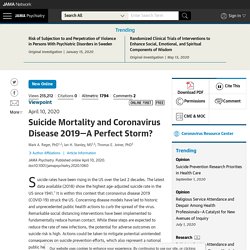
The latest data available (2018) show the highest age-adjusted suicide rate in the US since 1941.1 It is within this context that coronavirus disease 2019 (COVID-19) struck the US. Concerning disease models have led to historic and unprecedented public health actions to curb the spread of the virus. Remarkable social distancing interventions have been implemented to fundamentally reduce human contact. While these steps are expected to reduce the rate of new infections, the potential for adverse outcomes on suicide risk is high. Actions could be taken to mitigate potential unintended consequences on suicide prevention efforts, which also represent a national public health priority. Why Do the Elderly Commit Suicide? Source: Nadino/Shutterstock When most of us think about someone committing suicide, we don’t usually think about the very young or the very old.
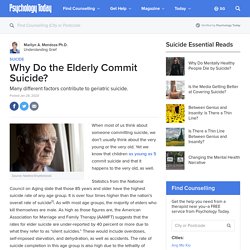
Yet we know that children as young as 5 commit suicide and that it happens to the very old, as well. Statistics from the National Council on Aging state that those 85 years and older have the highest suicide rate of any age group. It is over four times higher than the nation’s overall rate of suicide[1]. As with most age groups, the majority of elders who kill themselves are male. Article continues after advertisement There are many factors that might contribute to an elderly individual deciding to suicide. Depression and other mental and physical health issues can also be significant determining factors in an elder’s decision to commit suicide. Declining physical health in the aged is another factor contributing to suicide. It seems that when people become elderly, they become invisible. Aging is not easy. Number of elderly suicides at all-time high: SOS. SINGAPORE: When Madam Tan (not her real name), a widow in her 90s, suddenly lost her son to a heart attack, she thought all hope was lost.
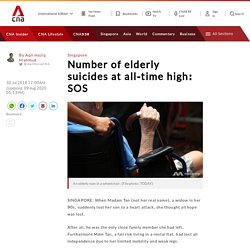
After all, he was the only close family member she had left. Furthermore Mdm Tan, a fall risk living in a rental flat, had lost all independence due to her limited mobility and weak legs. "Our care management team knew of her suicidal thoughts," senior social worker at Tsao Foundation's Hua Mei Mobile Clinic Jasmine Wong told Channel NewsAsia. So, staff from the organisation's counselling and coaching team provided her with psycho-emotional counselling and therapy, and worked with neighbours and community partners to support her daily living.
With Mdm Tan refusing to go to a nursing home, the staff made frequent visits to "reassure her that life has more to offer". But there are others who fall through the cracks. This is six cases more than 2016, when 123 elderly suicides were reported. However, SOS said fewer seniors are calling in. Singapore University of Social Sciences. Against the backdrop of falling birth rates in Singapore, citizens’ life expectancies have continued to climb.
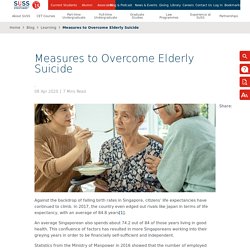
In 2017, the country even edged out rivals like Japan in terms of life expectancy, with an average of 84.8 years[1]. An average Singaporean also spends about 74.2 out of 84 of those years living in good health. This confluence of factors has resulted in more Singaporeans working into their greying years in order to be financially self-sufficient and independent. Statistics from the Ministry of Manpower in 2016 showed that the number of employed residents aged 70 and over surged from 16,000 in 2006 to 43,000[2]. While these positive developments should be applauded, the country is also seeing the rise of a new troubling trend — a growth in the cases of elderly suicide. Statistics provided by suicide-prevention agency, Samaritans of Singapore (SOS), showed that 129 people aged 60 and above took their own lives in 2017[3].